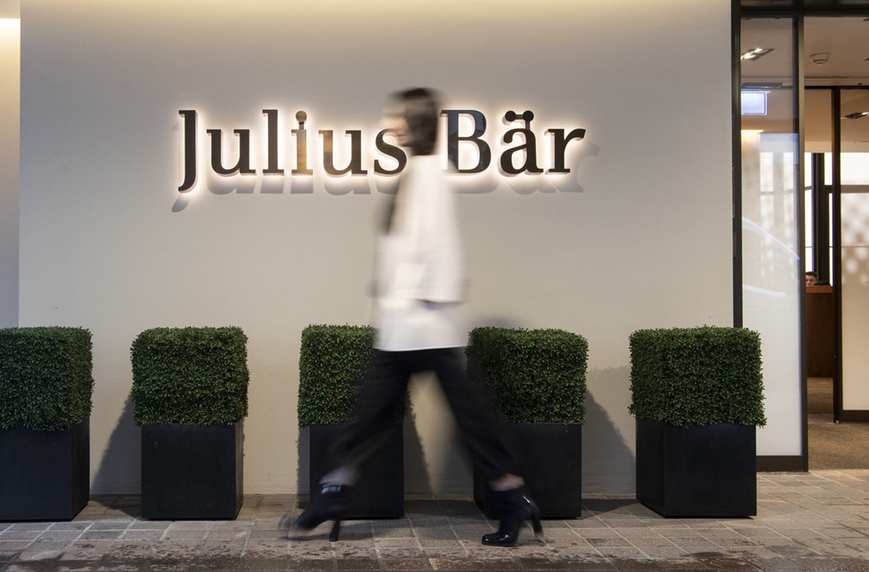
The Julius Baer group reported an 8% fall in assets under management to CHF392 billion ($417 billion) in its first-quarter results in May. Keystone / Ennio Leanza
Julius Baer has poached a senior executive from rival Swiss wealth manager UBS to set up a new division offering private equity and debt investments to its ultra-wealthy clients.
The move illustrates how a prolonged period of low interest rates has forced the likes of UBS and Credit Suisse to prioritise offering illiquid private investments to their super-rich clients, who agree to forgo access to their capital in the hope of achieving higher returns. For the banks, the higher fees that these funds typically charge can mean increased revenue for them.
Giuseppe De Filippo will join Switzerland’s third-largest bank in October along with three other members of his team at UBS. He will then recruit a larger team to focus on direct private investments.
“We saw a massive increase in interest in this space prior to Covid-19, mainly because of the quest for yield but also because some of the private businesses our clients can invest in are really attractive,” said Luigi Vignola, head of markets at Julius Baer. “We definitely were lagging [UBS and Credit Suisse] in the past because we didn’t have anything like this.”
Global assets in private equity and debt hit $5 trillion last year, according to data provider Preqin, and private assets have been growing at 10% annually in recent years.
De Filippo’s defection to Julius Baer comes just weeks after UBS announced internally that he would lead private markets distribution for Europe, the Middle East, Africa and Switzerland. De Filippo previously held global positions leading the bank’s direct investments group and corporate finance division.
The change in role was made as part of a shake-up of UBS’s wealth management business under co-heads Tom Naratil and Iqbal Khan, which is aimed at cutting costs and aligning the business closer with investment banking.
When Khan joined UBS from Credit Suisse last year, his departure caused ructions in the normally staid world of Swiss banking. Revelations that Khan and his family had been followed by private investigators led to the departure of Credit Suisse’s chief executive, Tidjane Thiam, and his chief operating officer, Pierre-Olivier Bouée, in a boardroom shake-up.
In February Philipp Rickenbacher, Julius Baer’s new chief executive, announced sweeping changes at the private bank, including cutting 300 jobs and ending relationships with wealthy clients that were no longer profitable enough. This followed a 37% year-on-year drop in net profits.
The group reported an 8% fall in assets under management to CHF392 billion ($417 billion) in its first-quarter results in May.
Julius Baer has been hit with sanctions by the Swiss markets regulator for its shortcomings in fighting money laundering. In February, the Financial Market Supervisory Authority banned Julius Baer from carrying out large acquisitions due to its connections to alleged cases of corruption between 2009 and 2018 linked to Petróleos de Venezuela (PDVSA), a Venezuelan state-owned oil and natural gas group, and Fifa, international football’s governing body.
In 2018 Julius Baer closed its office in Panama after Matthias Krull, an employee working in the country, pleaded guilty in the US to conspiracy to commit money laundering in connection with PDVSA funds.
Copyright The Financial Times Limited 2020
Full story here Are you the author? Previous post See more for Next postTags: Business,Credit Suisse,Featured,newsletter































